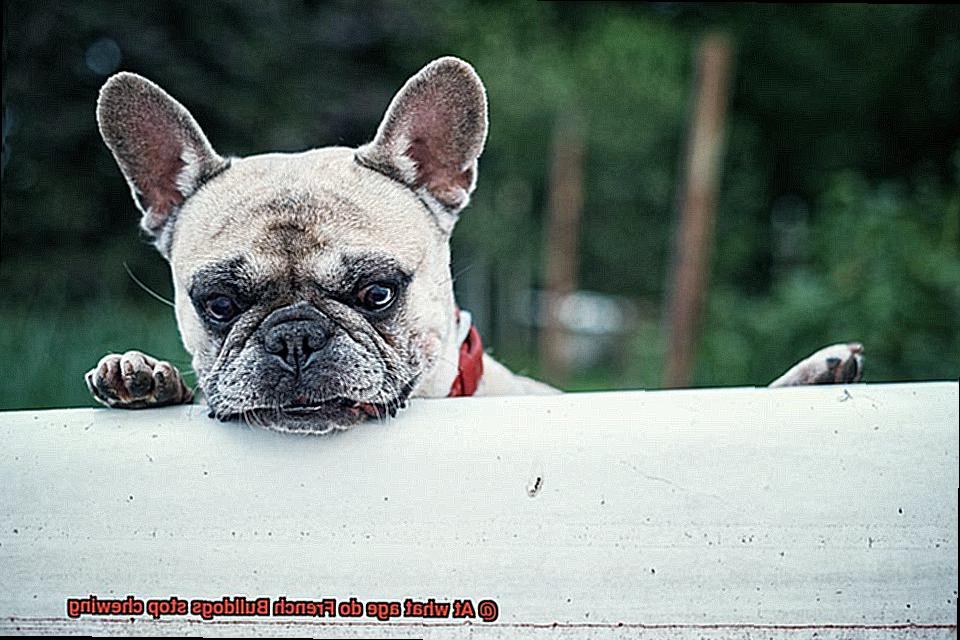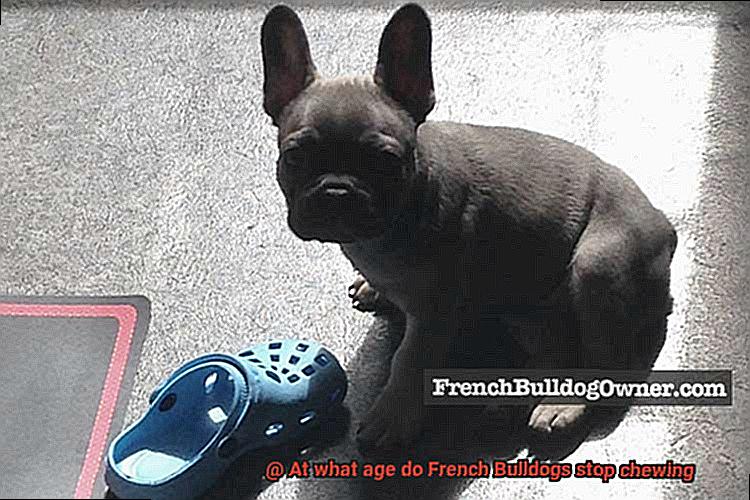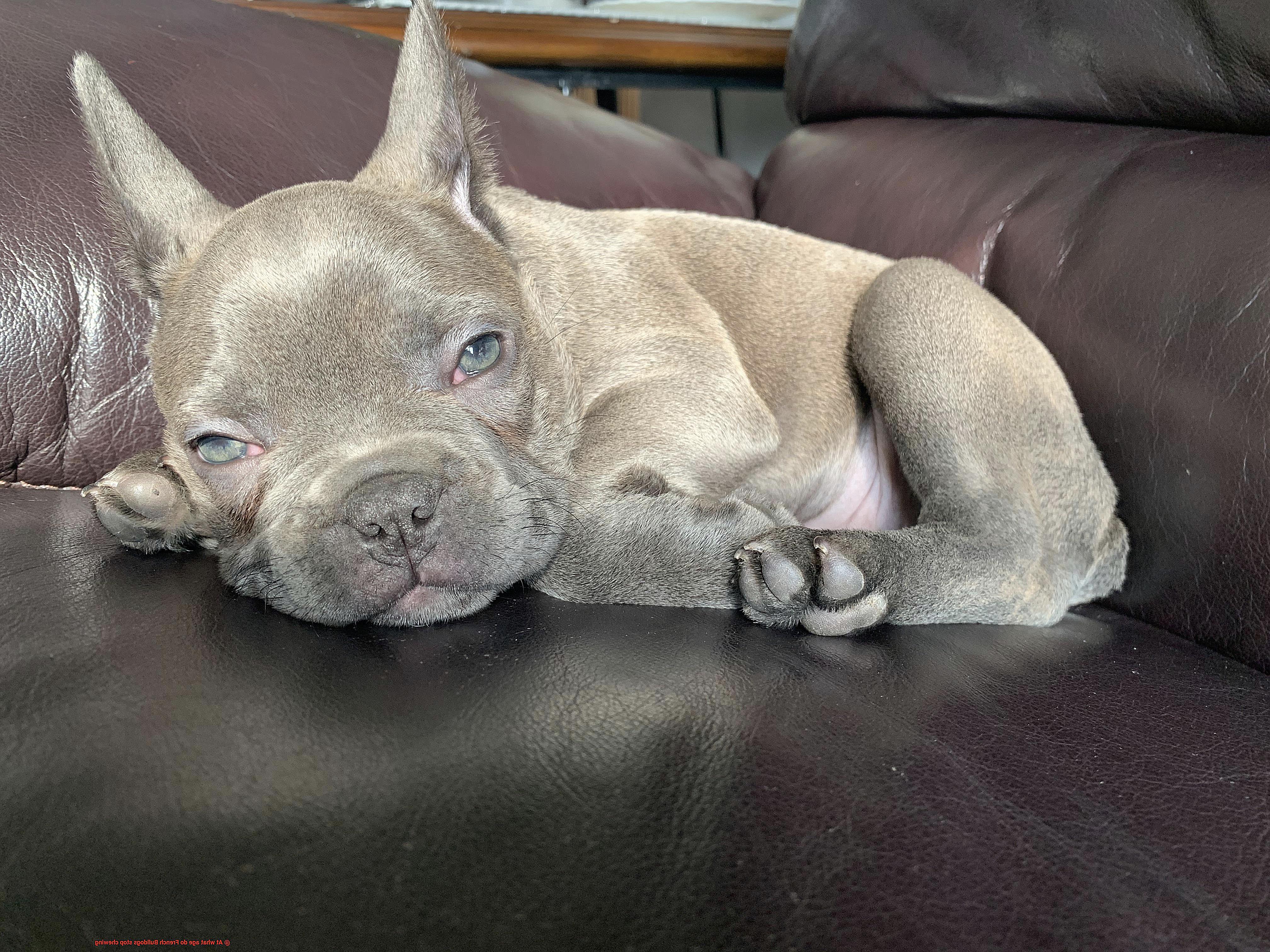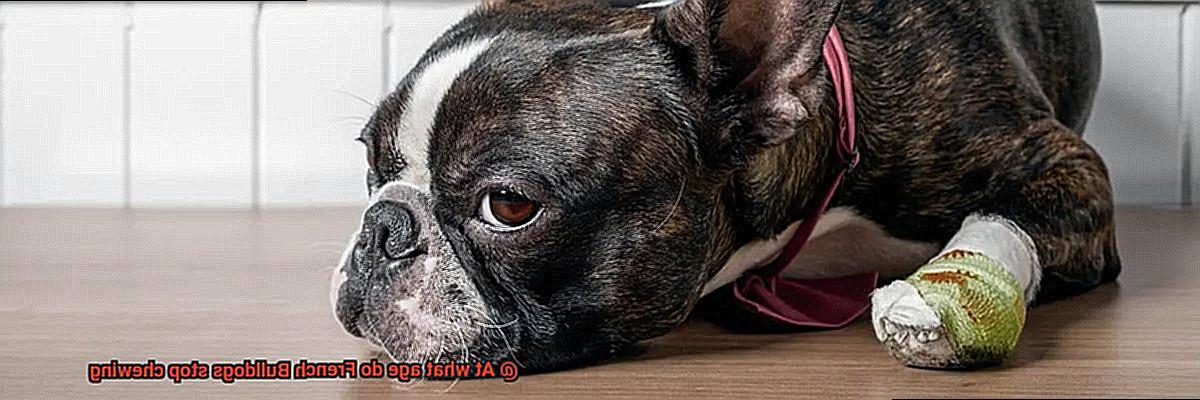At what age do French Bulldogs stop chewing?
The infamous chewing phase. If you’re a proud owner of a French Bulldog, you know all too well the chaos these curious and mischievous little furballs can cause with their teeth. From socks to chair legs, nothing is safe from their relentless gnawing. But fear not, my friend, because today we’re diving into the depths of this chewing frenzy to discover when it finally comes to an end.
In this captivating blog post, we’ll explore the ins and outs of French Bulldog chewing habits, uncovering the factors that influence how long this phase lasts. We’ll also provide you with essential tips to manage and minimize the havoc caused by these tiny jaws.
Join us on this thrilling journey as we unravel the mystery of French Bulldog chewing habits – a quest that will bring relief to current owners and vital knowledge for those considering adding these adorable little chewers to their families.
So, without any more delay, let’s embark on this exciting adventure to uncover the day when the French Bulldog’s chewing reign shall finally cease.
The Teething Phase: When Do French Bulldogs Start Chewing?
Contents
- 1 The Teething Phase: When Do French Bulldogs Start Chewing?
- 2 Redirecting Chewing Behavior: Providing Appropriate Toys and Bones
- 3 Persistent Chewing Instincts in Adulthood
- 4 Factors That Affect How Long French Bulldogs Continue to Chew
- 5 Training Your French Bulldog to Stop Chewing
- 6 Mental Stimulation and Environmental Enrichment for French Bulldogs
- 7 Professional Dental Care for French Bulldogs
- 8 Conclusion
The teething phase is a crucial stage in a French Bulldog’s life, and it plays a significant role in their chewing behavior. Understanding when this phase starts can help dog owners better manage their pet’s chewing habits. In this article, we will explore when French Bulldogs typically start teething, how it affects their behavior, and provide tips for managing their chewing habits.
When do French Bulldogs start teething?
French Bulldogs typically start teething between the ages of three to four months. This is when their baby teeth start to fall out, making way for their adult teeth. During this time, puppies may experience discomfort in their gums, prompting them to chew on objects to alleviate the pain.
Behavioral changes during teething:
- Excessive chewing: French Bulldogs may chew on various objects to relieve discomfort and help with the eruption of their adult teeth. It is important to provide appropriate chew toys and bones during this phase to redirect their chewing behavior and protect your belongings.
- Gum inflammation: Mild gum inflammation is common during the teething phase. If you notice excessive redness or swelling, consulting a veterinarian is recommended.
- Drooling: Teething puppies may drool more than usual due to increased saliva production. This is a normal part of the teething process and should subside as the adult teeth fully emerge.
Managing your French Bulldog’s chewing habits:
- Provide appropriate chew toys: Offer a variety of safe and durable chew toys specifically designed for teething puppies. Avoid toys that are too hard or small, as they can pose a choking hazard.
- Puppy-proof your home: Remove any valuable or dangerous items from your puppy’s reach to prevent them from being chewed on.
- Positive reinforcement: Reward your French Bulldog with praise and treats when they chew on appropriate toys instead of household items.
- Regular exercise: Engage your puppy in regular exercise and play sessions to help release excess energy and minimize destructive chewing.
- Consult a veterinarian: If you have concerns about your French Bulldog’s oral health or chewing behavior, it is important to consult a veterinarian for professional guidance.



Redirecting Chewing Behavior: Providing Appropriate Toys and Bones

French Bulldogs, like many other dog breeds, have a natural instinct to chew. This behavior is often seen in puppies as they explore the world around them and teething occurs. However, it is important to redirect their chewing behavior to prevent destructive habits from forming. Providing appropriate toys and bones is crucial in redirecting a French Bulldog’s chewing behavior.
Choosing the right toys and bones for your French Bulldog is essential. These items should be durable, safe, and engaging for the dog. It is recommended to choose toys made specifically for strong chewers, as French Bulldogs have powerful jaws. Rubber or nylon toys are great options for French Bulldogs, as they are durable and can withstand their chewing strength. Look for toys with different textures and shapes, as this can help keep the dog’s interest and prevent boredom.
Interactive toys are also beneficial in redirecting chewing behavior. Treat-dispensing toys or puzzle toys require the dog to work for their treats or food, providing mental stimulation and keeping them occupied. This not only redirects their chewing behavior but also provides them with a fun challenge.
Providing bones for your French Bulldog to chew on is another option. However, it is important to choose appropriate bones that are safe for the dog. Raw bones, such as raw beef or turkey necks, can be suitable options as they are softer and less likely to splinter compared to cooked bones.
Supervision is key when it comes to chewing on bones or toys. It is important to ensure that your French Bulldog does not swallow any small pieces that could pose a choking hazard. If you notice that your dog is breaking off large chunks of a bone or toy, it may be necessary to remove it and provide a safer alternative.
Rotating the toys and bones available to your French Bulldog can help keep their interest and prevent them from getting bored with the same items. This will also help prevent them from seeking out inappropriate items to chew on.
Training your French Bulldog to understand which items are appropriate for chewing is also essential. Using positive reinforcement techniques, such as rewarding them with treats or praise when they chew on their toys, can help reinforce the desired behavior.
It is important to note that while providing appropriate toys and bones can help redirect a French Bulldog’s chewing behavior, it may not completely eliminate it. Chewing is a natural behavior for dogs, and some may continue to chew throughout their lives to some extent. However, by providing them with appropriate outlets for chewing, you can minimize any potential damage to your belongings and promote their overall well-being.
Persistent Chewing Instincts in Adulthood
French Bulldogs are adorable and lovable companions, but they can also have persistent chewing instincts even after reaching adulthood. In this article, we will explore the reasons behind this behavior and provide tips on managing and redirecting their chewing habits. So, if you’re a proud owner of a French Bulldog who loves to chew, keep reading.
Reasons for Persistent Chewing Behavior:
Boredom and Lack of Mental Stimulation:
French Bulldogs are intelligent dogs that need mental exercise to stay engaged. When they lack mental stimulation, they may resort to chewing as a way to alleviate boredom. To combat this, provide them with interactive toys, puzzles, and engaging playtime sessions. These activities will redirect their chewing instincts towards appropriate objects.
Anxiety and Stress:
Just like humans, French Bulldogs can experience anxiety in various situations. Chewing can serve as a coping mechanism to relieve anxiety and provide comfort. If your Frenchie is showing signs of anxiety, address the underlying causes through behavior modification techniques or consult a professional for guidance.
Lack of Proper Training or Reinforcement:
Establishing clear boundaries and teaching your French Bulldog what objects are appropriate for chewing is essential from a young age. Consistency in training and positive reinforcement techniques, coupled with appropriate chew toys, can redirect their chewing instinct towards acceptable items.
Dental Health Issues:
Some French Bulldogs may chew excessively due to dental problems such as gum inflammation or tooth decay. Regular dental check-ups with a veterinarian and maintaining good oral hygiene can help address these issues, potentially reducing the need for excessive chewing.
Managing and Redirecting Chewing Behavior:
- Provide Suitable Chew Toys: Invest in durable chew toys specifically designed for French Bulldogs. These toys should be tough enough to withstand their strong jaws and provide them with a satisfying chewing experience.
- Supervise and Redirect: Keep a close eye on your Frenchie when they are in a chewing mood. If you catch them chewing on inappropriate items, calmly redirect their attention to an appropriate chew toy. Praise and reward them when they chew on the right objects.
- Engage in Interactive Play: Regular interactive play sessions, such as fetch or tug-of-war, can help tire out your French Bulldog both mentally and physically. A tired Frenchie is less likely to engage in destructive chewing behavior.
- Seek Professional Help: If your French Bulldog’s chewing behavior persists despite your efforts, consult a professional dog trainer or behaviorist. They can provide personalized guidance and help address any underlying issues contributing to the behavior.
Factors That Affect How Long French Bulldogs Continue to Chew
French Bulldogs are notorious for their love of chewing, and there are several factors that contribute to this behavior. So, let’s dig in and explore why your Frenchie just can’t resist sinking their teeth into everything.

- Teething Stage: Ah, the dreaded teething stage. Just like human babies, French Bulldogs go through a phase where their gums itch and ache as new teeth start to emerge. This discomfort prompts them to chew on anything they can find to alleviate the pain. This phase typically starts around 3 to 4 months of age and can last up to 7 months. So, if your Frenchie is still chewing, it might be because they’re teething.
- Breed Characteristics: French Bulldogs have strong jaws and an innate love for chewing. It’s in their genes. While some breeds may outgrow their chewing habits sooner, Frenchies tend to hold onto this behavior for longer. So, even after the teething stage has passed, they may continue to indulge in chewing as a way to keep themselves entertained.
- Boredom and Energy Release: Dogs often chew out of boredom or excess energy. And trust me when I say that French Bulldogs are no exception. These little bundles of energy need regular exercise and mental stimulation to keep them happy and content. If they don’t get enough physical and mental exercise, they may resort to chewing as a way to release pent-up energy or alleviate boredom.
- Training and Socialization: Proper training and socialization play a crucial role in curbing unwanted chewing behaviors in French Bulldogs. From a young age, it’s important to teach your Frenchie what items are appropriate to chew on and what are off-limits. Consistent training, positive reinforcement, and redirecting their attention to appropriate chew toys can help establish good chewing habits and discourage destructive chewing.
- Separation Anxiety: French Bulldogs are known for their strong attachment to their owners, and separation anxiety can be a common issue in this breed. When left alone for extended periods, they may resort to destructive behaviors like excessive chewing as a coping mechanism. Addressing separation anxiety through gradual desensitization, providing interactive toys, or seeking professional help can help reduce their chewing tendencies.
- Health Issues: Sometimes, excessive chewing in French Bulldogs can be a sign of underlying health problems. Dental issues, allergies, gastrointestinal discomfort, or nutrient deficiencies can all contribute to increased chewing behavior. If you notice your Frenchie chewing excessively despite providing appropriate chew toys and mental stimulation, it’s best to consult with your vet to rule out any health concerns.
Training Your French Bulldog to Stop Chewing
Chewing is a natural behavior for dogs, and French Bulldogs are no exception. However, it’s important to teach them what is acceptable to chew on and what is off-limits. In this section, I will share expert tips and techniques to help you train your French Bulldog to stop chewing.
- Provide appropriate chew toys: Start by offering a variety of durable and safe chew toys specifically designed for puppies. These toys should be interesting and engaging for your French Bulldog. Experiment with different textures, shapes, and sizes to find what your Frenchie enjoys.
- Supervise and praise: When your French Bulldog chooses an appropriate chew toy, praise them enthusiastically. Positive reinforcement is key in training. This will reinforce their good behavior and help them understand what is expected of them.
- Redirect and discourage: If you catch your French Bulldog chewing on something they shouldn’t, interrupt the behavior by saying “no” firmly. Then, immediately redirect their attention to an appropriate chew toy. This teaches them that there are designated items for chewing.
- Be consistent: Consistency is crucial in training your French Bulldog. Establish clear boundaries and consistently reinforce them. Enforce the rule that only designated chew toys are allowed to be chewed on.
- Avoid punishment: It’s important not to punish or scold your Frenchie for chewing. This can create fear or anxiety around chewing objects and may lead to other behavioral issues. Instead, focus on positive reinforcement and redirection.
- Use deterrents: Consider using deterrent sprays or bitter-tasting substances on items you want to protect from chewing. These products can help discourage your dog from gnawing on them.
- Provide exercise and mental stimulation: A tired dog is less likely to engage in destructive chewing out of boredom or excess energy. Make sure to provide plenty of physical exercise through walks, playtime, and interactive toys. Mental stimulation, such as puzzle toys or training sessions, can also keep your French Bulldog occupied and satisfied.
- Seek professional help if needed: If your French Bulldog’s chewing habits persist despite your training efforts, it may be helpful to consult with a professional dog trainer or behaviorist. They can provide personalized guidance and assistance to address any underlying issues.

Mental Stimulation and Environmental Enrichment for French Bulldogs
French Bulldogs are adorable companions with an innate tendency to chew. While chewing is a normal behavior, it can become destructive if not properly redirected. In this blog post, we’ll explore how providing mental stimulation and environmental enrichment can help prevent destructive chewing behavior in French Bulldogs.
The Role of Mental Stimulation:
- Dogs thrive on mental challenges and stimulation.
- Lack of mental stimulation can lead to destructive behaviors.
- Interactive toys, such as puzzle toys or treat-dispensing toys, keep their minds engaged.
- Training sessions provide mental exercise and strengthen the bond between you and your furry friend.
Ways to Provide Mental Stimulation:
- Use interactive toys that require problem-solving skills.
- Teach new commands, tricks, or obedience exercises through positive reinforcement.
- Keep training sessions short, frequent, and positive.
- Reward desired behaviors with treats or praise.
The Importance of Environmental Enrichment:
- An enriched environment offers alternative outlets for your dog’s energy.
- Reduces boredom and prevents destructive chewing.
- Create a designated play area with various toys and objects.
- Rotate toys regularly to maintain interest.
Incorporating Sensory Experiences:
- Dogs have highly developed senses that can be stimulated.
- Play calming music or nature sounds to create a soothing environment.
- Use scented toys or diffusers for added sensory enrichment.
- Provide different types of surfaces for them to walk on (grass, sand, tiles) to engage their senses.
Regular Exercise:
- Exercise is crucial for mental and physical well-being.
- Daily walks, playtime, and interactive games burn off excess energy.
- A tired dog is less likely to engage in destructive chewing behavior.
Preventing destructive chewing in French Bulldogs requires redirecting their chewing habits towards appropriate objects and providing mental stimulation and environmental enrichment. Interactive toys and training sessions keep their minds engaged, while creating a designated play area and incorporating sensory experiences provide alternative outlets for their energy. Regular exercise is essential for overall well-being.
Remember, chewing is a natural behavior, so redirecting it and providing outlets for their energy is key. Your French Bulldog will be happier and less likely to engage in destructive chewing with these strategies in place.
Professional Dental Care for French Bulldogs
However, their unique facial structure can contribute to dental problems if not properly cared for. In this blog post, we will explore the importance of professional dental care for French Bulldogs and discuss measures that can be taken to maintain good oral hygiene.
Why Professional Dental Care Matters:
Professional dental care is vital for French Bulldogs to prevent dental diseases such as periodontal disease and tooth decay. These conditions can lead to pain, infection, and other health issues if left untreated. Regular teeth cleanings performed by a veterinarian or dental specialist, known as dental prophylaxis or scaling and polishing, remove plaque, tartar, and bacteria from the teeth and gums.
Frequency of Professional Dental Care:
The frequency of professional dental cleanings may vary depending on factors such as the dog’s oral health, age, diet, and genetics. Generally, it is recommended to schedule a professional dental cleaning at least once a year for most dogs. However, some French Bulldogs may require more frequent cleanings if they are prone to dental problems or have existing dental issues.
At-Home Dental Care:
While professional dental care is crucial, at-home dental care plays an equally important role in maintaining good oral hygiene for French Bulldogs. Here are some measures you can take:
- Daily Tooth Brushing: Use a dog-specific toothbrush and toothpaste to brush your French Bulldog’s teeth daily. This helps remove plaque and prevent tartar buildup.
- Chew Toys: Provide appropriate chew toys that promote dental health. Look for toys specifically designed to clean teeth and massage gums. Avoid toys that are too hard or small, as they can cause damage or choking hazards.
- Balanced Diet: Ensure your French Bulldog’s diet supports oral health. Feeding a balanced diet that includes dental-friendly treats and kibble can help reduce plaque buildup.
- Regular Monitoring: Keep an eye on your French Bulldog’s oral health. Look out for signs of dental problems such as bad breath, swollen or bleeding gums, loose teeth, or difficulty eating. If you notice any of these signs, consult with a veterinarian for further evaluation and treatment.
Conclusion:
Professional dental care, accompanied by proper at-home dental care, is crucial for maintaining good oral health in French Bulldogs. Regular teeth cleanings, daily tooth brushing, providing appropriate chew toys, and monitoring oral health are key measures to prevent dental diseases and promote overall well-being. By taking these steps, you can ensure that your French Bulldog’s smile remains bright and healthy for years to come.
xQAHkw2_QxI” >
Conclusion
French Bulldogs, like all puppies, are notorious chewers. However, as they mature and grow older, their chewing habits tend to diminish. By the time they reach adulthood, typically around 1 to 2 years old, most French Bulldogs have outgrown their chewing phase.
As these adorable canines transition into adulthood, their teeth become fully developed and their urge to explore the world through their mouths lessens. They start to understand what is acceptable to chew on and what is off-limits. This newfound maturity brings relief to many pet owners who may have been frustrated by the constant need to replace chewed-up shoes or furniture.
It’s important to note that while most French Bulldogs stop chewing excessively as they age, some individuals may continue this behavior for longer periods. Factors such as individual temperament and training methods can influence how quickly a French Bulldog outgrows its chewing tendencies.
To help your furry friend overcome excessive chewing, it’s crucial to provide them with appropriate chew toys and engage in regular exercise and mental stimulation. These activities not only redirect their energy but also promote healthy dental hygiene.




